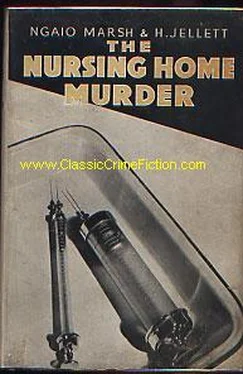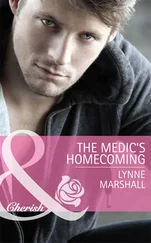Ngaio Marsh - The Nursing Home Murder
Здесь есть возможность читать онлайн «Ngaio Marsh - The Nursing Home Murder» — ознакомительный отрывок электронной книги совершенно бесплатно, а после прочтения отрывка купить полную версию. В некоторых случаях можно слушать аудио, скачать через торрент в формате fb2 и присутствует краткое содержание. Жанр: Классический детектив, на английском языке. Описание произведения, (предисловие) а так же отзывы посетителей доступны на портале библиотеки ЛибКат.
- Название:The Nursing Home Murder
- Автор:
- Жанр:
- Год:неизвестен
- ISBN:нет данных
- Рейтинг книги:5 / 5. Голосов: 1
-
Избранное:Добавить в избранное
- Отзывы:
-
Ваша оценка:
- 100
- 1
- 2
- 3
- 4
- 5
The Nursing Home Murder: краткое содержание, описание и аннотация
Предлагаем к чтению аннотацию, описание, краткое содержание или предисловие (зависит от того, что написал сам автор книги «The Nursing Home Murder»). Если вы не нашли необходимую информацию о книге — напишите в комментариях, мы постараемся отыскать её.
The Nursing Home Murder — читать онлайн ознакомительный отрывок
Ниже представлен текст книги, разбитый по страницам. Система сохранения места последней прочитанной страницы, позволяет с удобством читать онлайн бесплатно книгу «The Nursing Home Murder», без необходимости каждый раз заново искать на чём Вы остановились. Поставьте закладку, и сможете в любой момент перейти на страницу, на которой закончили чтение.
Интервал:
Закладка:
Chief Inspector Alleyn felt himself to be in the foolish position of one who sets a match to the dead stick of a rocket. Dr. Roberts had most effectively stolen his fireworks. He had a private laugh at himself. Roberts continued angrily:
“They call themselves Communists. They have no interest in the welfare of the community — none. Last night I attended one of their meetings and I was disgusted. All they did was to rejoice for no constructive or intelligent reason over the death of the late Home Secretary.”
He stopped abruptly, glanced at Alleyn, and then with that curious return to nervousness which the inspector had noticed before he said: “But, of course, I had forgotten. That is very much your business. Thoms rang me up just now to ask me if I could attend at the hospital this afternoon.”
“ Thoms rang you up?”
“Yes. Sir John had asked him to, I believe. I don’t know why,” said Dr. Roberts, suddenly looking surprised and rather bewildered, “but I sometimes find Thoms’s manner rather aggravating.”
“Do you?” murmured Alleyn, smiling. “He is rather facetious.”
“Facetious! Exactly. And this afternoon I found his facetiousness in bad taste.”
“What did he say?”
“He said something to the effect that if I wished to make my get-away he would be pleased to lend me a pair of ginger-coloured whiskers and a false nose. I thought it in bad taste.”
“Certainly,” said Alleyn, hurriedly blowing his own nose.
“Of course,” continued Dr. Roberts, “Mr. Thoms knows himself to be in an impregnable position, since he could not have given any injection without being observed, and had no hand in preparing the injection which he did give. I felt inclined to point out to him that I myself am somewhat similarly situated, but do not feel, on that account, free to indulge in buffoonery.”
“I suppose Mr. Thoms was in the anteroom all the time until you went into the theatre?”
“I’ve no idea,” said Roberts stiffly. “I myself merely went to the anteroom with Sir John, said what was necessary, and joined my patient in the anæsthetic-room.”
“Ah, well — we shall get a better idea of all your movements from the reconstruction.”
“I suppose so,” agreed Roberts, looking perturbed. “It will be a distressing experience for all of us. Except, no doubt, Mr. Thoms.”
He waited a moment and then said nervously: “Perhaps this is a question that I should not ask, Inspector Alleyn, but I cannot help wondering if the police have a definite theory as regards this crime?”
Alleyn was used to this question.
“We’ve got several theories, Dr. Roberts, and all of them more or less fit. That’s the devil of it.”
“Have you explored the possibility of suicide?” asked Roberts wistfully.
“I have considered it.”
“Remember his heredity.”
“I have remembered it. After he had the attack in the House his physical condition would have rendered suicide impossible, and he could hardly have taken hyoscine while making his speech.”
“Again remember his heredity. He might have carried hyoscine tablets with him for some time and under the emotional stimulus of the occasion suffered a sudden ungovernable impulse. In the study of suicidal psychology one comes across many such cases. Did his hand go to his mouth while he was speaking? I see you look incredulous, Inspector Alleyn. Perhaps you even think it suspicious that I should urge the point. I — I — have a reason for hoping you find that O’Callaghan killed himself, but it does not spring from a sense of guilt.”
A strangely exalted look came into the little doctor’s eyes as he spoke. Alleyn regarded him intently.
“Dr. Roberts,” he said as last, “why not tell me what is in vour mind?”
“No,” said Roberts emphatically, “no — not unless — unless the worst happens.”
“Well,” said Alleyn, “as you know, I can’t force you to give me your theory, but it’s a dangerous business, withholding information in a capital charge.”
“It may not be a capital charge,” cried Roberts in a hurry.
“Even suppose your suicide theory is possible, it seems to me that a man of Sir Derek’s stamp would not have done it in such a way as to cast suspicion upon other people.”
“No,” agreed Roberts. “No. That is undoubtedly a strong argument — and yet inherited suicidal mania sometimes manifests itself very abruptly and strangely. I have known instances…”
He went to his bookcase and took down several volumes, from which he read in a rapid, dry and didactic manner, rather as though Alleyn was a collection of students. This went on for some time. The servant brought in tea, and with an air of patient benevolence, poured it out himself. He placed Roberts’s cup on a table under his nose, waited until the doctor closed the book with which he was at the moment engaged, took it firmly from him and directed his attention to the tea. He then moved the table between the two men and left the room.
“Thank you,” said Roberts vaguely some time after he had gone.
Roberts, still delivering himself of his learning, completely forgot to drink his tea or to offer some to Alleyn, but occasionally stretched out a hand towards the toast. The time passed rapidly. Alleyn looked at his watch.
“Good Lord!” he exclaimed, “it’s half-past four. We’ll have to collect ourselves, I’m afraid.”
“Teh!” said Roberts crossly.
“I’ll call a taxi.”
“No, no. I’ll drive you there, inspector. Wait a moment.” He darted out into the hall and gave flurried orders to the little servant, who silently insinuated him into his coat and gave him his hat. Roberts shot back into the sitting-room and fetched his stethoscope.
“What about your anæsthetising apparatus?” ventured Alleyn.
“Eh?” asked Roberts, squinting round at him.
“Your anæsthetising apparatus.”
“D’you want that?”
“Please — if it’s not a great bore. Didn’t Sir John tell you?”
“I’ll get it,” said Roberts. He darted off across the little hall.
“Can I assist you, sir?” asked the servant.
“No, no. Bring out the car.”
He reappeared presently, wheeling the cruet-like apparatus with its enormous cylinders.
“You can’t carry that down the steps by yourself,” said Alleyn. “Let me help.”
“Thank you, thank you,” said Roberts. He bent down and examined the nuts that fastened the frame at the bottom. “Wouldn’t do for these nuts to come loose,” he said. “You take the top, will you? Gently. Ease it down the steps.”
With a good deal of bother they got the thing into Roberts’s car and drove off to Brook Street, the little doctor talking most of the time.
As they drew near the hospital, however, he grew quieter, seemed to get nervous, and kept catching Alleyn’s eye and hurriedly looking away again. After this had happened some three or four times Roberts laughed uncomfortably.
“I–I’m not looking forward to this experiment,” he said. “One gets moderately case-hardened in our profession, I suppose, but there’s something about this affair” — he blinked hard twice —“something profoundly disquieting. Perhaps it is the element of uncertainty.”
“But you have got a theory, Dr. Roberts?”
“I? No. No. I did hope it might be suicide. No — I’ve no specific theory.”
“Oh, well. If you won’t tell me, you won’t,” rejoined Alleyn.
Roberts looked at him in alarm, but said no more.
At Brook Street they found Fox placidly contemplating the marble woman in the waiting-room. He was accompanied by Inspector Boys, a large red-faced officer with a fruity voice and hands like hams. Boys kept a benevolent but shrewd eye on the activities of communistic societies, on near-treasonable propagandists, and on Soviet-minded booksellers. He was in the habit of alluding to such persons who came into these categories as though they were tiresome but harmless children.
Читать дальшеИнтервал:
Закладка:
Похожие книги на «The Nursing Home Murder»
Представляем Вашему вниманию похожие книги на «The Nursing Home Murder» списком для выбора. Мы отобрали схожую по названию и смыслу литературу в надежде предоставить читателям больше вариантов отыскать новые, интересные, ещё непрочитанные произведения.
Обсуждение, отзывы о книге «The Nursing Home Murder» и просто собственные мнения читателей. Оставьте ваши комментарии, напишите, что Вы думаете о произведении, его смысле или главных героях. Укажите что конкретно понравилось, а что нет, и почему Вы так считаете.











